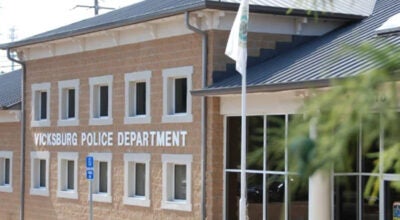Vicksburg visits the Neshoba County Fair
Published 12:00 am Friday, July 27, 2001
Family members congregate around the coffee table for conversation on the back porch of their cabin at the Neshoba County Fair Wednesday. Clockwise from left, Norma Laird, Alice Murphy, Anse Dees and Beth Brant listen as Buddy Dees of Vicksburg leads the story. (The Vicksburg Post/MELANIE DUNCAN)
[07/27/01] NESHOBA FAIRGROUNDS, Miss. Things would really be great if his grandfather, Paul, were here, says Anselm J. “Buddy” Dees Jr.
The elder Dees could confirm all the stories that have been circling around Cabin 210 at the Neshoba County Fair, stories that Anselm Dees Sr. has been bouncing off Buddy and Buddy’s son, also named Paul. He could tell the inquiring visitor if Gov. Theodore G. Bilbo really sat on the porch of the family’s original cabin back in the 1920s, whether pine knots really were burned to illuminate Founder’s Square back then.
If Grandfather Paul were here, the generations would rest in complete symmetry Paul and Anse, Anse and Paul.
Barring a reversal of the laws of mortality, though, some of the past is going to have to remain in legend, if only just a little bit on this evening filled with the smell of fried chicken, beer and rain.
And Dees looks around his cabin and decides that’ll be just fine.
Buddy Dees, an attorney, is one of the Vicksburg residents who regularly attend the Neshoba County Fair, which ends Friday south of Philadelphia.
The fair, really a communal gathering of families in rustic cabins for a week, started in 1889 for agricultural shows and county fellowship, a purely local affair with roots in church tent revivals.
It’s different now.
The expansion of educational and economic opportunities during the 20th century combined with traditional forces like marriage to sweep away the sons and daughters of Neshoba people like Dees, who moved to Vicksburg after finishing law school in 1976. Consequently, families across the Magnolia State have blood connections to this red-clay enclave as well as places to stay at its annual reunion.
Lunch at Vicksburg resident D.D. Davidson’s cabin brings visitors from Vicksburg, Meridian, Union and Jackson together over chicken, potato casserole and bottomless pitchers of iced tea.
“It’s definitely become something for everybody in Mississippi,” said Davidson, a Union native and Vicksburg engineer who’s been going to fairs since the late 1940s. “I’m surprised I haven’t seen more people from Vicksburg here.”
Politicians have recognized the event’s popularity, too, making the fair famous for its Wednesday and Thursday campaign speeches, some of the few that are still delivered before live audiences.
Pictures of Ross Barnett, Ronald Reagan and Trent Lott adorn the walls of most cabins, souvenirs of their speeches at fairs past. Snapshots of Michael Dukakis, who visited during his futile presidential campaign in the late 1980s, are usually kept out of sight.
“Are you really 80?” a visitor asks Anse Dees Sr., the gregarious patriarch of Cabin 210.
“No; I don’t think so, at least,” Dees replies.
“Really? Your son told me you were 80,” the visitor says.
“Oh, yes, I’m 80. I thought you asked if we were related,” says the only slightly hard-of-hearing Dees, a native of Philadelphia who now lives in Greenville.
Dees isn’t related to the visitor, but he and Buddy Dees, his eldest son, can claim family ties by blood or marriage to at least 30 other people at the fair. So can Davidson, the WES engineer. So can Jane Giffin, who’s been staying at her father’s cabin all week. So can Anne Doyle. And Randy Jolly.
Except for the elder Dees, they’re all Vicksburg residents with Neshoba County connections, a handful of the 20,000 people who filled fairground cabins this year. And they all cite relatives as the main reason for making the weeklong trip to the fair. The bands, talent shows and headache-inducing fair rides that also fill the week are sideshows to family conversation, they say.
“We see people here who we don’t see ever again during the year,” Doyle said.
Three or four generations of kin congregate for seven days at Neshoba in cabins with as many levels, structures that have become the trademark of “Mississippi’s Giant House Party.” Bunk beds for 50 people are pushed together in high-ceilinged rooms, scrap lumber is used to panel walls and clothes are hung in the open.
“It’s a lot more comfortable now than it used to be,” Giffin said of her family’s cabin. “It’s like deer camp with amenities.”
For all the value attached to family by the fairgoers, history seems to take pre-eminence in assessments of the fair’s success.
“Families used to live together, after all, and that’s a big part of the appeal” Giffin said. “This is how it used to be.”
Fairs in the last decade have troubled those who want to keep Neshoba as old-fashioned as possible, to keep out all the cellular phones and laptop computers that signify modernity.
“It’s supposed to be a week with no deadlines,” said Randy Jolly, a Vicksburg art teacher who lived in Philadelphia until he was 4.
“I’d have a law against them if I could,” Giffin said of cell phones.
Not as many complaints are heard about such modern inventions as air conditioning and indoor plumbing.
Still, for all the sights and sounds of the 21st century that have invaded the fairgrounds, some have always perceived the fair as a brief chance to embrace a world that doesn’t exist anymore.
“It’s family values, slow living,” Davidson said. “Where else do you have anything like this?”
Mississippi is a place, William Faulkner famously wrote, where the past never dies. And each of its residents, Yazoo City author Willie Morris said, “want(s) to know as much as possible about the rest….”
These twin currents the urge to remember and the urge to gather flow together on a typical night on the Neshoba County fairgrounds.
Teen-agers, the girls wearing all varieties of animal-skin prints, the guys in baseball caps and polo shirts, fill the narrow dirt streets between the cabins and dance to the live music under the Pavilion. They’re from places as far apart as Ohio and the Delta, and the fair is the one time they see each other.
Parents like Dees sit on the cabin porches until the early-morning hours and keep a lenient watch over the people they used to be.
“When you have kids, you want them to do what you did, to go through what you went through,” Dees said. “You want them to have the same experiences that you had.”
Dees’ son Paul, 24, has repeated the fair experience every year of his life. He said the annual repetition, with its familiar people and unchanging rituals, has given him a sharp perspective on the changes in his life.
“It used to be that I’d go out at night here, and I wouldn’t want to come home until 4:30 in the morning,” said Dees, who farms in Washington County. “Now it gets to be 1 and I’m ready to go to bed. I feel a lot older.”
His father still stays up until 4.
“It’s the fair, man,” Buddy Dees says. “That’s what it’s for!”





